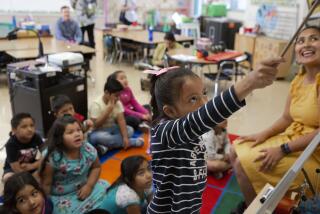Minnesota to Pay for Students’ Head Start in College Classes
- Share via
ST. PAUL, Minn. — High school juniors and seniors in Minnesota will get a chance to go to college this fall, and, for the first time in the nation, the state will pick up the cost.
“If parents and students sit down and carefully think through this option and start planning in the ninth grade, they effectively can have the first year of college paid for,” said House Majority Leader Connie Levi. “It is a major structural change in the education system.”
Susan Traiman, a research associate at the National Institute of Education in Washington, D.C., said qualified high school students for years have been able to attend college, but either their parents have borne the costs or they have done so on scholarships.
Unique Concept
“What’s unique about the Minnesota proposal is the concept of state aid following the student,” she said.
“Clearly, the Minnesota approach is one way to allow students to progress not based on age and traditional grade groupings,” which was a recommendation of the National Commission on Excellence in Education in its report, “A Nation at Risk,” she said.
But the president of the Minnesota Education Assn., the state’s largest teachers union, said legal problems await the program.
“The potential exists for K-12 (public elementary and secondary) money to directly subsidize nonpublic schools,” said Marti Zins. She said it could lead to a legal challenge over the constitutional provision for separation of church and state because students would be allowed to attend classes at private, church-affiliated colleges.
Zins also noted the law favors those students who live close enough to a post-secondary institution to participate in the program.
The new enrollment options for 11th- and 12th-grade students were passed by the legislature earlier this year and signed into law by Gov. Rudy Perpich.
Students expected to take advantage of the option are those who may want to study a particular foreign language or take advanced mathematics courses or arts classes that are not offered by their schools, Levi said.
Not Just for Gifted Students
“It was not designed as a program only for the gifted and talented or students,” said Lani Kawamura, a Perpich education adviser. “It’s a program for students who feel that they would have their needs better met by something . . . in a college or university.”
Under the program, 11th- and 12th-graders may apply to eligible public and private colleges, universities and vocational-technical institutes in the state to enroll full time or part time in non-sectarian courses. Each institution will decide whether to accept the student and can choose not to be involved if participation would raise its costs too high.
Credits earned may apply toward both a high school diploma and a college degree.
More to Read
Sign up for Essential California
The most important California stories and recommendations in your inbox every morning.
You may occasionally receive promotional content from the Los Angeles Times.












